My life by David Garland
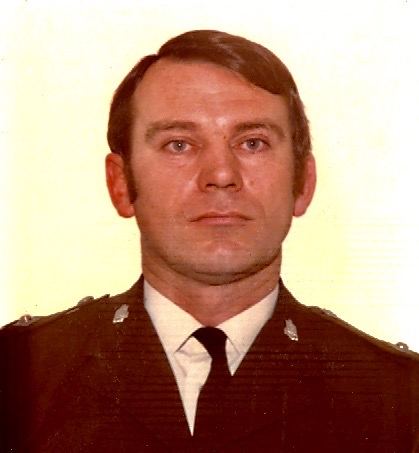 Inspector Davie "Dave" Garland
Inspector Davie "Dave" Garland
I was born on the 16th of April 1937 at a farmhouse called “West Leven” in Leven, Yorkshire. I was born out of wedlock and my mother Ada joined the Army Transport Service and served six years.
Throughout the Second World War the only parents I knew until I was nine years old were my grandparents who I called mam and dad.
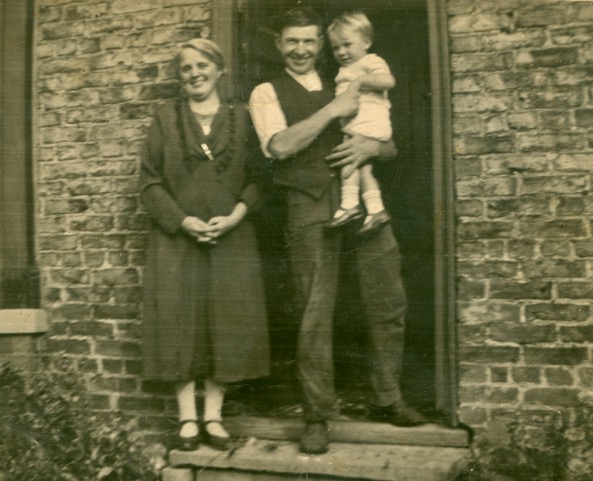 Young Dave (aged 2) with his grandparents Harry Storey Garland and Mary Garland
Young Dave (aged 2) with his grandparents Harry Storey Garland and Mary GarlandLife growing up on a small farm was tough. At an early age I was expected and did easy jobs, like feed the chickens. We had two hundred of them. I would collect the eggs every day, and after school would wash them and pack them in trays.
As I got older I was expected to do more. At 10 I took a two-wheeled sack barrow to the corn merchant in the village and collected two sacks of pig meal, one at lunch break and one after school. I did anything else as requested by dad, and I was then allowed to go out to play with other kids in the village; cricket in the summer and soccer in the winter. I was “sports mad”!
I attended Leven Church of England school till l was thirteen after which I got accepted to the High School, a part of Hull Municipal Technical college. I loved every minute there, and the first reason was soccer. We had a great team and won the Hull schools league - both seasons I played for them.
I then worked for a building contractor in Beverley, the county town of the Riding.
When I was eighteen I was called up for National Service and I signed on for three years in the Royal Military Police (RMP). That was in November 1955. After training I was posted to Catterick. About a year later the CO called me into his office and told me he was sending me to 49th Div RMP Territorial Army as a Drill and Motor Driving Instructor. He said the Sgt MT recommended me, and I would be stationed in Huddersfield.
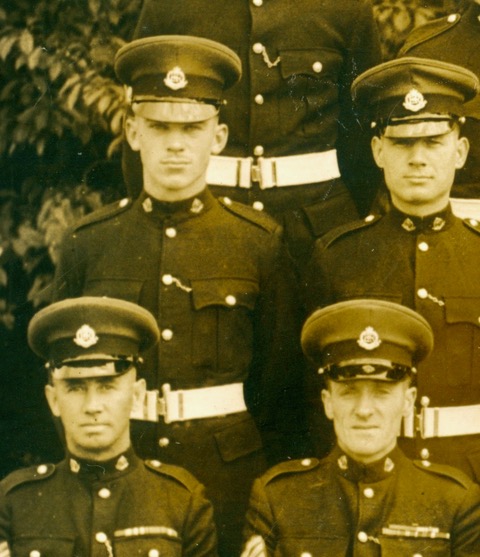 Instructor Corporal Dave Garland (top left) at Royal Military Police Camp at Folkstone
Instructor Corporal Dave Garland (top left) at Royal Military Police Camp at FolkstoneI lived in civvy digs for two years. Drill night was Tuesdays and I drove over to Leeds Thursday nights at the detachment. Whilst there we went to camps near Folkestone and Whitley Bay in Northumberland. I could go home for the weekend in Leven in a jeep as long as I wore uniform there and back. Captain Buchanan OIC tried one on me. He gave me an extra stripe a month before I was due for de-mob and told me he would make it substantive if I signed on again but I would be posted to Berlin.
Those were happy days. Capt “Buck” as-we called him got me involved in Curling as one day a member of his team had a serious heart problem so every Thursday we drove over the Pennines to Manchester. It didn’t take me long to realize what a skillful game it was.
I had started thinking about what I wanted to do after de-mob and one day I bumped into an old school mate called Wilf Cooper who had joined the Hull City Police Force. I asked him what it was like in the Police. He told me it was a good job and he recommended it. I decided to apply and give it a go, and sure enough I was accepted.
Capt “Buck” had been a superb officer and when I told him I’d been accepted by the East Yorkshire police he wished me well.
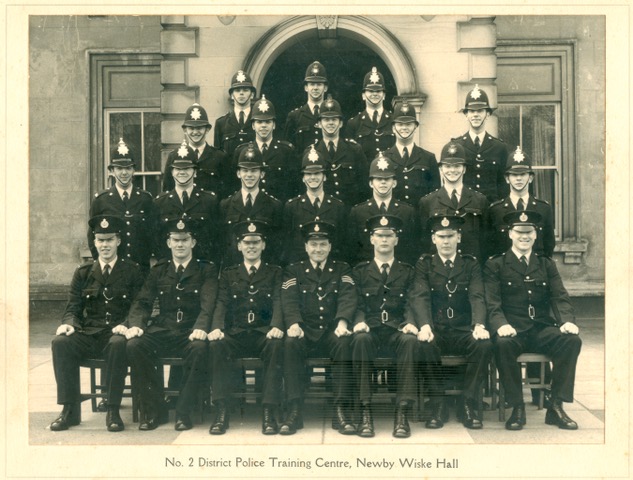
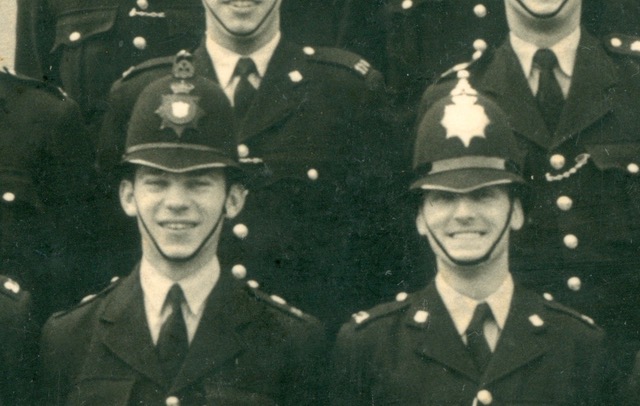 P.C.'s Dave Garland (left) and cousin Charlie Garland on Training Course
P.C.'s Dave Garland (left) and cousin Charlie Garland on Training Course at Newby Wiske Police Training School
I then attended the Newby Wiske Police Training School which was the training school for north-east England. After completing the course I was posted to Driffield, the market town at the southern edge of the Yorkshire Wolds where the busiest day was market day on a Wednesday. The streets in town would be full of Landrovers; most would have a Jack Russell in them, windows half open and often the keys in the ignition but don’t ever try to get those keys!
One Wednesday I was called to the hospital after a man had gone there with a terrible bite. I took all his particulars and walked the streets. After half an hour I found blood on the glass widow of a Landrover. Inside the vehicle was a vicious looking terrier. I backed off, got the registered number, then headed back to see the injured man in the hospital where he admitted he’d tried to steal the vehicle. Next stop I took him to the station and booked him. Received a “Well Done” note to file.
After six months I was posted to Bridlington, a ghost town from the end of October to Easter. I swear it was the coldest place I have ever worked in. After another six months I was posted To Filey.
The day I moved to Filey, I was carrying my bags out of my digs and who do you think should be coming in to take my place, or should be coming in to take my place, was Ronnie Woodhouse. My parting comments to him were "best of luck you will need it”. The next time I saw Ronnie was two years later - in Bermuda. We had a good laugh and he agreed that Bridlington was the coldest ass place in the world. He had heard that I had joined the police in Bermuda and he said that after just over a year in Bridlington he could take no more.
I loved Filey which was a little seaside town. One day walking along the promenade I saw a loose boxer dog. I had seen a dapper old gentleman walking two of them on many occasions and I had seen where he lived. I caught the dog and used my whistle lanyard as a lead. I knocked on the door and got a real shock! It was the great England and Yorkshire opening bat, Herbert Sutcliffe. He invited me in and I spent a wonderful half hour talking to him with a cup of tea while he sipped his scotch Next day on 4 to 12 shift the sergeant told me the chief inspector wanted to see me. I thought, ‘what now?”
He told me that Mr Herbert Sutcliffe had called him about the dog and wished to say what a caring and observant constable I was. That resulted in another “Note to file”.
I often worked lates and nights on my own with a key to the station. About this time I became unsettled as a police officer. Young guys like me were “used”, for want of a better word!
I did however keep myself in good shape. In 1960 I competed in the Police District Games in County Durham and came third in the triple jump with a leap of 43ft and was presented with an AAA Bronze medal. It was the first and the last time I ever competed in the triple jump which was one tough event.
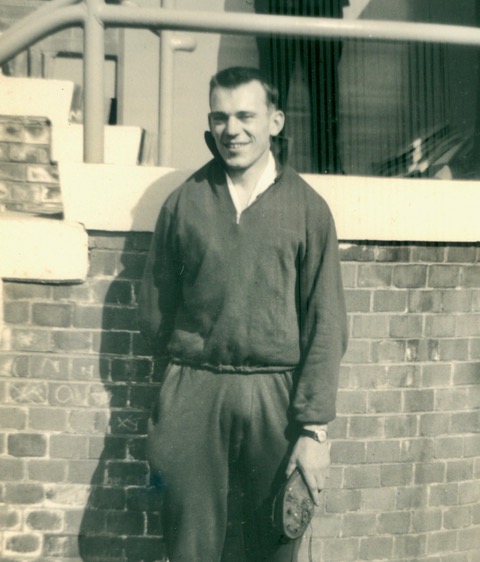 Young P.C. Dave Garland competes in Triple Jump at
Young P.C. Dave Garland competes in Triple Jump at
Police District Games, County Durham in 1960
The last straw came one night about 1 am when I came across three young guys attempting to steal a car in a garage car park. I arrested them, cuffed one, and marched them all to the police station. Whilst trying to get the key out of my pocket at the station door the two not cuffed ran off. I put the cuffed guy in a cell and rung the bell in the sergeant’s flat above the station. He came down and he rang another constable – his mate - to come out, and they took off in the car after telling me to process the prisoner etc and stay at the station. They returned at 6 am with the two escapees cuffed together. The sergeant told me I could go home.
I went to back to work at 11pm that night and when I read the station diary it was recorded that they had appeared in Court in front of a Justice of the Peace who found them guilty as charged by the sergeant. They were servicemen and were bound over and handed to the Regimental Police.
There was not a mention anywhere of Constable Garland! They even recorded in the Station diary that all three were searched etc and taken to court at 10am. As far as they were concerned I didn’t exist.
Whilst I was stationed at Filey I met Derek Jenkinson and we became good mates. He was a photographer taking pictures of tourists and couldn’t find a suitable job in Filey. We got along really well and as a result I borrowed my dad’s car and we set off for a two week drive through Europe where we visited France, Belgium, Holland, Germany, Denmark, Sweden and NorwayI.
It was while we were touring Europe for a few weeks that I told Derek I was applying to join the Colonial Police and hoped to work abroad. Following on from this I rang up the Crown Agents at 4 Millbank in London and got two application forms, one for me and one for Derek. Derek filled his in immediately. A few days later Derek and I got dates for our interviews for the Bermuda Police Force and we were both successful. I can still remember being interviewed by Commissioner George Robins and another officer. Two weeks later Derek was attending Hendon Police Training School, and after his training course, in February 1961, he flew to Bermuda.
After being accepted to go to Bermuda I resigned from the East Riding Police. I didn’t have to attend Hendon because I was already a trained policeman but I took a months holiday before flying out to Bermuda on my birthday the 16th of April 1961, was taken to the single mens quarters at Admiralty House, and was sworn in the next day at police headquarters.
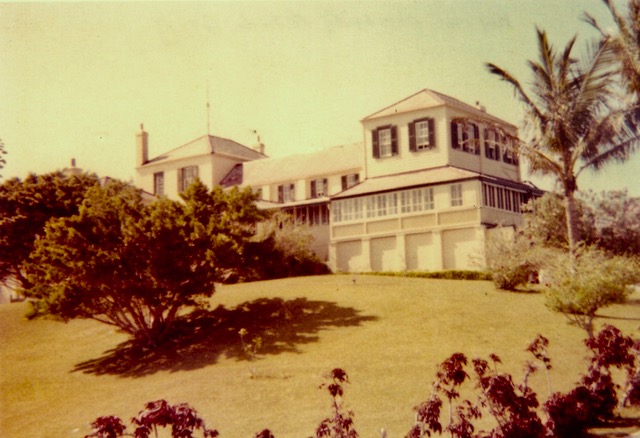 Admiralty House circa 1961
Admiralty House circa 1961
Whilst I worked on this first shift, one day I was asked to see Captain Burns, the Harbourmaster. What a joke! We were checking moorings in the harbour, standing on docks! A short while after that I was sent to a home in Fairylands where an outboard motor had been stolen. I took all the details and returned to the station. I had noticed that there had been quite a few incidents of stealing from boats in recent months.
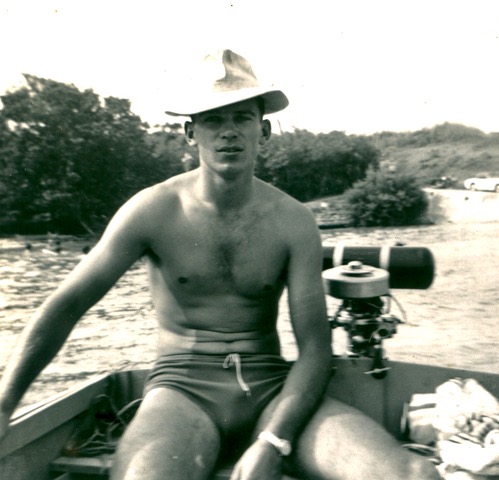 Young P.C. Dave Garland in his first boat
Young P.C. Dave Garland in his first boat
Towards the end of summer in 1961, I had a conversation with my mate Derek Jenkinson about why the Force didn’t have a marine section. After quite a few discussions we decided to submit a report to the Commissioner of Police outlining our thoughts about the need for a police boat and suggesting that we could build one.
Derek was a superb mechanical engineer who used to work on boats in Filey, and I was a farmer’s son and had to fix whatever needed fixing on our farm so I was fairly handy.
A short while later we were requested to submit a plan and a price to build a boat. We thought that we could accomplish this for about £130. Where the money was coming from was a problem we had to resolve ourselves. Having met Captain Burns I went to City Hall and met with the Secretary, Herman Leseur, and explained our dilemma. In January 1962 the money was forthcoming from the Corporation of Hamilton who also gave us a couple of sheets of plywood and other useful timber. After submitting this offer to Commissioner George Robins we were given the go-ahead to build a boat.
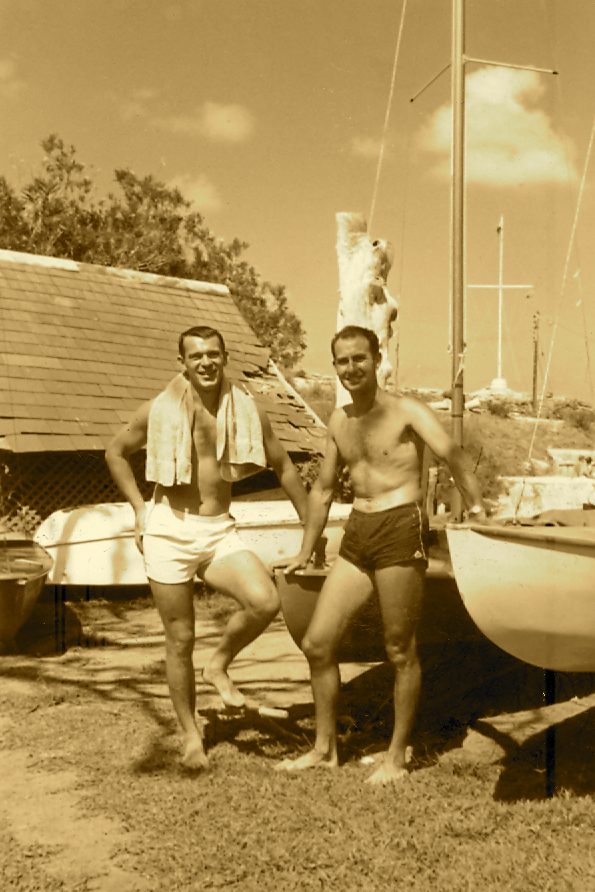 Dave Garland and Derek Jenkinson built our first Police boat at Admiralty House
Dave Garland and Derek Jenkinson built our first Police boat at Admiralty House
We set to in the old shed at the slip at Admiralty House, and in addition to the money and timber from the Corporation of Hamilton we had to “beg, steal and borrow” all kinds of material, and we finished the boat in three months. Derek rebuilt one good engine out of two that had been donated by Marine and Ports. The boat, named “Blue Heron” was officially launched and blessed by the Commissioner’s wife. Marine Section was now in business.
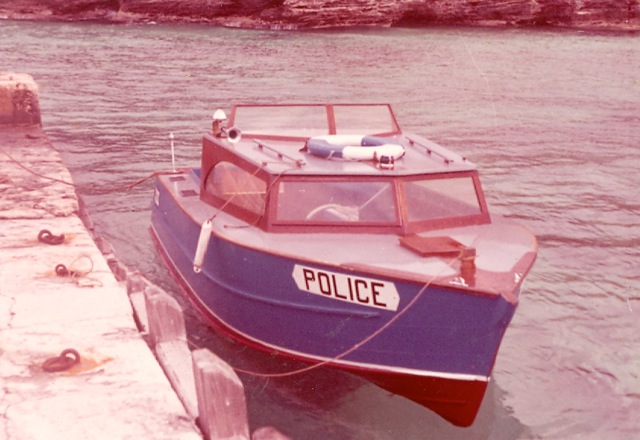 Newly built "Blue Heron" - 1962
Newly built "Blue Heron" - 1962
After “Blue Heron” was finished I was moved to Cycle Squad and Derek went to Traffic Dept. We were called out to fix anything that went wrong. Eventually I spoke to Chief Inspector “Nobby” Clark that we were being used and we didn’t think it was fair. Those first guys on Marine Section included Alastair Johnson, Brian Malpas and Bill “Spider” Mackenzie.
After about 2 years Derek and I fitted an inboard outboard engine. This lasted about two years after which an old Marine and Ports boat was used, and would you believe it, Marine Section was then closed down.
In early summer I got a call to go and see Chief Inspector “Nobby” Clark and he told me that a new boat would be arriving on the Queen of Bermuda on her next trip. He informed me that I would be acting Sergeant of Marine Section and told me to provide him with the names of five officers who would be suitable for the Marine Section. I gave him the following names - Eddie “Boxhead” Foggo, Keith Lovell, Chris Hole, and Gerry Swales. And Mr Clark said, “…and Willy Woods.” At this time I also recommended that we upgrade the standard of personnel in the section by making it mandatory to have a ‘C’ pilots license. He agreed to this and I set up a course at Police Training School starting a week from the following Monday. This was an intense course Monday to Friday 8 to 5 with revision Saturday morning. By this time I already had my Pilots Licence.
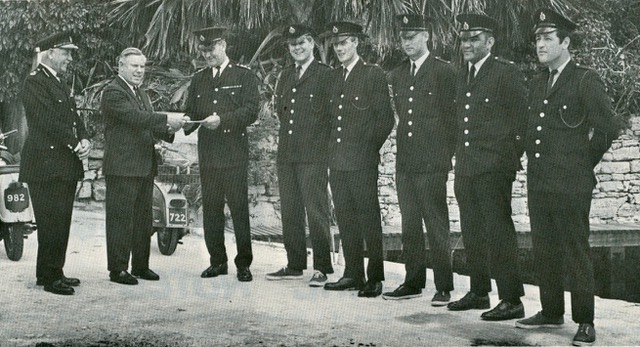 Members of the newly formed Police Marine Section, together with Supt "Nobby" Clark
Members of the newly formed Police Marine Section, together with Supt "Nobby" ClarkChief Inspector Clark told me he also wanted to take the course. I had two days to get all the paperwork and syllabus organised. The following Tuesday all members of the course passed their ‘C’ pilots license examinations. Three weeks later the Section was working again. Before we took delivery of the new boat I got permission to put down a mooring in Barr’s Bay and the use of an old storeroom from the Corporation of Hamilton as an office and storeroom. This building had previously been used by U.S. Shore Patrol and became the Marine Police Station.
I would like to say that this group of officers on the Section were first class and very proud of their jobs. In a short time we made an excellent impression on the boating public, and this was maintained for some years.
On completion of the training course for members to join the Marine Section I was approached by Captain Ian Clark, the Harbourmaster, about teaching the same course at the Bermuda College. I did so and by 2016 when I retired from teaching the course after completing 40 years at the College I had taught more than 500 students to get their Pilots License. Most of these were interested in charter fishing and jobs on the water.
My prime student went on to become the Warden of Pilots. I gave this young man private lessons in my own home on top of the course he did at the college. After my recommendations through Captain Clark, he obtained a position for him to go to sea. When he returned to Bermuda some three or four years later he became a pilot, and he went on to become the Warden of Pilots. We still remain close friends today and I would have to say that I’m very proud that he went on to do so well.
About eighteen months after we moved into the Marine Police Station we took into service a second boat, same as Blue Heron which was named White Heron. This gave us full coverage of the whole of Bermuda and the territorial waters, i.e. 12 miles out from Bermuda’s reef edge. We had a boat on duty from 8 am to midnight each day and weekends in the summer till 2am.
I made a list of all the islands with property on them, who the owners were, and their contact numbers. We made regular checks of these properties and cut the breaking and entering of same down to a few each summer. I well remember receiving two phone calls commending the section for our diligence. This was brought to Supt Clark’s notice by one of the owners. I was told we got a mention of good work from the COP.
About this time we started a Diving Section and attended PADI (Professional Association of Diving Instructors) courses with a USA instructor. Five members all passed their courses. I must mention here two members who were outstanding divers and through Supt Clarke’s connections on the Base, Alex Arnfield and Graham Maddox attended and completed the US Navy Seals diving course in Florida.
These two did a controlled dive to the bottom of Argus Bank supervised by Harry Cox - 180 ft. We had by this time built an excellent understanding with the boating public, especially on correct lights on boats after sunset, the carrying of life jackets for all on board, licensing of boats, and all facets of the Marine Board Act. We also assisted Marine and Ports re mooring problems and I suggested to the Director that charts showing all registered moorings should be kept. This was done. Lots of warnings were given and names taken which I believe created an overall respect for boating safety requirements.
Around this time I submitted a report to both the COP and the Director of Marine and Ports suggesting that a good move would be to re-organize the policing of Bermuda waters similar to that in the Florida Keys, incorporate the Marine Section with Fisheries Wardens Dept, and introduce Regiment soldiers into a training programme for possible selection for future recruitment.
We had all the inshore resources already but would need a vessel for offshore work. We were already taking soldiers at weekends to patrol with the officers and a few years later when I was head Fisheries Warden I did the same. I presented this report at a meeting with the Marine Board and other Government Officers at Government House which caused a lot of negative comments i.e. some didn’t like it as obviously they were worried about losing some of their authority. However, the Director of Marine and Ports agreed with me, but nothing came of it.
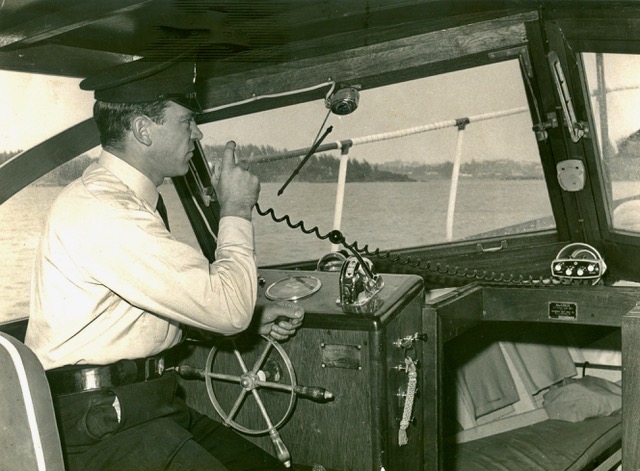 Sgt. Dave Garland at the helm of Blue Heron
Sgt. Dave Garland at the helm of Blue Heron
l was promoted to Sergeant on 1st April 1969, and by then Marine Section had built a substantial presence on the waters, with respect from the boating public.
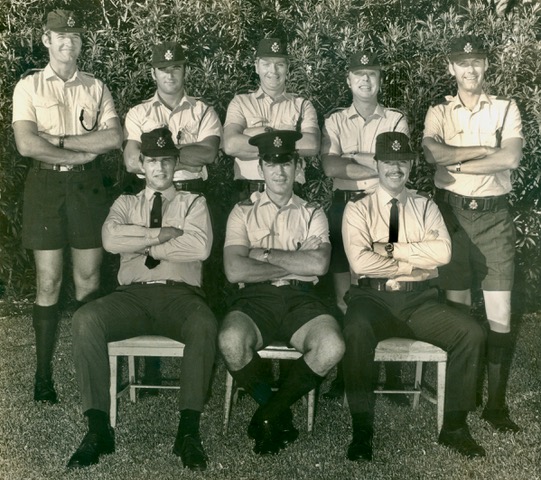 Members of the Police Marine Section - date
Members of the Police Marine Section - date
Standing (l-r) Alex Arnfield, Graham Maddocks, Pete Swann, Les Tomlinson & Gerry Ardis
Seated - Paul Wakefield, Sgt Dave Garland & Andy Lavery
In December 1973 I was promoted to Inspector and shortly afterwards moved to the City. Before I moved, Superintendent Clarke read me a short list of potential names for Sgt I/C Marine Section, and from that list I recommended Phil Every. He got the job and did an excellent job. For me the Marine Section was very special. “Nobby” Clark knew that but sadly, over the years after Phil got moved to Traffic, the section went through what I would call the falling apart of Marine Police. As of this writing (in 2019) I believe there is a small crew with one boat. The section would appear to be in decline, playing second fiddle to the RBR (Royal Bermuda Regiment) Boat Section - an absolute shame. I have been spoken to by many of the boating fraternity about what has happened to the Police Marine Department. My answer is, “Your guess is as good as mine!”
Anyone would think I was “Nobby’s” right-hand man. Yes, we were good friends. We fished together and won a few dart tournaments as partners but, no he was always “Sir” at work and I got no favours of any sort. I will say, he was the best officer in the Service who got things done and I know he treated everyone the same way. He was highly respected by all and I have never heard a bad word said about him
Over the next couple of years I did shift work and made a real effort to motivate all who worked on my shift. Talking to Detective Inspector Clive Donald in Central CID one day he told me that he was very concerned about break-ins in the City area. I picked a couple of the men and we did a few road blocks around the City after property had been checked. (Property checks involved literally going through the City checking doors and accessible windows to make sure they were secure.) The result was instant! on Cedar Avenue about 1am one morning we tried to stop a man on a mobylette. He dropped the bike and ran away and we failed to catch him, however he dropped a nail bar, and a big screwdriver. We took the bike back to the station, secured it and I got Peter Duffy, the Station constable to write it up in the Station Diary. When I went into the station for night shift the next night, D.C. Bill Black had locked the culprit up and he had coughed up 28 B and E’s.
“C.D.” (Clive Donald) was very happy. We did a couple more with success but the best was yet to come. C.D. told me he had many complaints about cigarette and drinks machines being broken into at the staff area at the Princess Hotel - over 30 of them. With the same guys, we set up observations around the staff door area and across the road. About 1am one night a guy came down Rosemont Avenue, crossed Pitts Bay Road and went through the staff entrance door. After about twenty minutes he came out with his pants pockets down round his knees. We arrested him. I was in the Inspectors car in Bacardi’s Drive. I drove over and we all piled in and went back to the station. The guy we arrested had over $200 in 25cent pieces. Supt Donald was very pleased. He told me he had recommended all of us for a commendation. The three constables got theirs, but no mention of Dave Garland. I found out later that a certain Supt in Headquarters had blocked mine. No names, no pack Drill - an old Army saying!
Shortly afterwards I was given the Job of Coroner’s Officer. I did this for two years. James Astwood was the Coroner and Chief Magistrate. He was a fabulous, no nonsense, man to work for. I often said to him we need somebody like you as the COP, but he always said no thanks.
I remember submitting a report through OIC Central and having the landlord of Seaview bar, near Dock Hill, brought before the court the day after men had come out of the club and thrown rocks and bottles at police cars. It came before Senior Magistrate Astwood and took him about three seconds after I read my report to tell the landlord, “Your licence is no more. This is the third time and there will not be a fourth!”
I also was lumped in with Government House even though there was full time supervision there! One day Mr Clark called me and said, I want to see you right now in my office. As I went into the room he said guess what the …. I can’t repeat his words in print! The pool at Government House had had all the water drained out of it. “Nobby” said H.E. had rung him and sounded off about it. “Go up there now. Get the facts and come back here. I need a course of action. “
Of course this was hilarious and the poor culprit, a policeman (P.C. Phil Taylor) who had accidentally opened the wrong valve in the pump house after being given very poor instructions about which valve was which, was then given the nickname “Draino”! No action was taken against him.
I brought to Mr. Clark a list of complaints from the men who had worked up at Government House; one was that the men thought they should not be drawing curtains on the upper floors; one officer stated he had gone into a room to draw the curtains and in the corner of the room he saw the governor in a state of undress standing on his head - doing yoga! To beat it all I attended Government House one time with Supt Clark, and when we got inside the Inspector OIC was hanging a picture in the passage. “Nobby” as we all knew him was not very happy to say the least and he bollocked the Inspector.
The Inspector was moved soon afterwards and I was stuck with the job for the next three or more months. I now had responsibilities for Government House, Coroners Officer and also did relief for Inspector Joe Colton as Supreme Court Officer.
The whole issue at Govt House was brought before the Dept Governor who supported the police and many changes were made which the then Governor was none too happy about.
My next move came a few months later when, at the request of Detective Supt Clive Donald, I was moved to Murder Squad. There was an ongoing inquiry into the murder of “Stringy” Symonds and I was put in charge of the Actions Room. Not long after we had another a guy named Pilgrim murdered, and a few days later Supt Donald told me to go immediately to Supt Sheehy’s office. I went straight there and on entering I saw Henry McCallam sitting in a chair looking very scared and silent. Mr Sheehy said he had been brought in as a suspect for the murder of Pilgrim but Henry said he would only speak to me.
He had told the arresting officers that he wouldn’t talk to any black officer and that he would only talk to “Mr Garland”. I sat down in front of him, very close - knee to knee. I had known him since he was a young lad about ten, playing truant from school and living rough around Admiralty House. I said to him, “Are you in trouble Henry and he said “yes”. “Is it big trouble?” He said “yes”. I told him I had to caution him and did so. He said Pilgrim came to his shack and said I’m moving in here. I told him no way, he said you don’t understand, I am moving in. He knocked me up against the wall, and threatened me again. I took a piece of 2 by 4 near the wall and when he turned his back to me I hit him on the head. Henry then dragged Pilgrim’s body down the hill from his shack, put him in a punt then rowed out into the Great Sound and dumped him in the water. The body was eventually found near Two Rock Passage, and a witness later described how he’d seen Henry dragging something into his punt at Mills Creek.
Henry said he’d been frightened of Pilgrim. He then made a full statement to me under caution in the presence of Mr Sheehy. I charged him with murder but I thought it would be reduced, I completed the file in five days as “John Joe” said I couldn’t go on holiday at the weekend if the file wasn’t finished.
I had first met Henry when he turned up on the dock at Admiralty Cove one morning as a young lad. It took me days to get him to speak. I asked him when he’d last eaten. He said two days ago. When I went to lunch at the police club I asked Mrs “B” (Brangman) to make me a beef sandwich and I explained to her the reason. Mrs “B” was a lovely woman and she gave me the sandwich plus a nice piece of cake, and we did that often.
Henry had gone to West Pembroke school where he was constantly bullied because he said they called him a “nigger child” - his mother was white. It took me weeks to get him to talk but I let him use my small boat. He was a natural fisherman and often caught fairly large fish. He said the truant officer had caught him once and hit him and thrown him into the back of the car. When the driver was getting into the front Henry jumped out and ran off with the truant officer man shouting at him, “You little bastard. I’ll cut your arse next time.”
Henry became very close to me. I tried and tried to get him to go back to school but he told me he would only run away again if I tried.
Henry was convicted of the murder of Pilgrim and when he came out of prison after serving his sentence he had aged a lot. I saw him in town one day and he told me he had health problems. I asked him if he had seen a doctor and he told me that there was no point. I took this to mean that he had a serious internal problem and didn’t push it any further than that. I didn’t see him for a couple of years, then one day he was in a wheelchair outside the toilets on front Street. He sat there nearly every day if the weather was good. I often went over for chat with him and gave him a couple of dollars. About a year later I was told that he had died.
After I returned from holiday I was moved back to the city from Murder Squad but it was to me “same old same old, and after long discussions with my wife I decided to take a new path and resigned.
I was offered the job of Director of Security at Southampton Princess Hotel. What an eye-opener that was.
The union seemed to run the place. Guests would often complain that their rooms had strange smells. I visited a couple and it was obvious it was marijuana smoke. I spoke to management about putting a couple of cameras in some of the rooms but management were not happy with that idea.
I decided to try and find out how the drugs were coming into the hotel and by the biggest stroke of luck one day I searched the disco looking for a diamond earring that a lady thought she had lost in there. After a while I sat on one of the seats at the corner near the door and the seat felt loose. I lifted the top and inside was a brown paper shopping bag. I looked in it and it had about 100 small envelopes of marijuana. I contacted Narcotics who attended shortly afterwards. I left them to it, only to find out later that they had bungled the operation. The man had picked up the bag but had escaped when the officer approached him. He had dropped the bag and bolted through the door. About an hour later the fun began. The chief engineer came to my office and told me that his department was out on strike - against me.
Next the General Manager was briefed and he was very concerned about the problem. We had a few harsh words and I explained to him the law about marijuana. The next day the corporate chief engineer flew in from New York. I was sitting in my office when the door burst open and this little man jumped in front of my desk and said loudly “Who the hell do you think you are creating this problem?” I replied, “Who the hell do you think you are not introducing yourself. Now I’m being rude, get out of this office”. I got up and opened the door I said “OUT.” We then had an official meeting with him and I explained the Law and asked what they were going to do about the chief engineer taking out his department on strike. There was silence then the manager said I can’t complain about you taking the course of action you did. Leave this to us and we will sort it out.
However, I did have some interesting work from time to time. One of them was the visit of Henry Kissinger who stayed at the hotel. I had to arrange in-house security with a bodyguard.
I left the Southampton Princess shortly after that, and Sue and I made the decision to go back to the U.K. where we settled in Sue’s hometown, Swansea. I got a job as Store Manager at the Atlas Automatic Sprinkler Company, and our children were enrolled in school there, but it was too cold for us, and we eventually decided to return to Bermuda.
I started work as a self-employed handyman, doing painting, repairs and maintenance. I set up a company, Home Improvements and Maintenance, and had several people working for me. I was about to take a break and retire when I was approached by John Barnes who was then the Director of Agriculture and Fisheries. He hired me as the Fisheries Officer, taking over from another former policeman, Brian Malpas, and that kept me active and very busy for 7 years, after which I finally decided to retire.
Shortly after retiring from Fisheries I was having lunch at Mid Ocean Club with my son Chris who was working there as the Senior Assistant Pro, when I was approached by Brian Mewitt who offered me a part-time position at the Mid Ocean Club as their van driver making deliveries, picking up office supplies, doing their banking, and making purchases for every department. Although it was part-time it kept me busy and the staff were a very nice bunch. It was a great place to work. One of the perks of the job was that I could play golf whenever I had the time, and of course Mid Ocean is a beautiful golf course.
SPORTING ACTIVITIES
I’ve always loved playing sports of all kinds and taking part in outdoor activities having been brought up by a grandfather who was an outstanding junior rugby player and was on Hull’s books before the First World War where he received injuries from shrapnel that ended his rugby league career. He was a stickler for fitness and had me running to the top of the field on our farm and back again 3 times at least for five nights a week. He used to say the fittest survive and win games.
I guess my earliest success in sports was when I won the Victor ludorum at Leven CE School after winning the 100 yards, the 200 yards, and the long jump and high jump.
After joining Leven CE School I was 12 when I made the school football team playing with kids 13 and 14. In the first year we got to the semi-final of east Yorkshire Schools and in the second year we got to the final but got beat by a single penalty. We were a smaller school in the competition.
The next year I went to Hull Municipal Technical School where I made the school football team when I was 14. We won the Hull Schools Football League, and again the next year, in September of my 15th year. We had the unique distinction of not losing a game and as of 2000 that record still stood.
After leaving school I played football for Long Reston the top side in Hull and east Yorkshire. I played for them till I was 18 then I went into the army. I was stationed at Catterick and while there there I played rugby soccer and hockey.
I later had trials for Hull City. I scored a good goal but didn’t get signed which was a big disappointment. I was also asked to try out for Sheffield Wednesday but nothing came of it. I played for the Long Reston Football Club till I was 18 when I got called up for the Army. After joining the Military Police for 3 years I tried out rugby for the first time. At the first practice night I told the captain I could kick goals, and he asked me to take a couple of kicks. I set the ball on the centre spot and the captain said that’s a bit long, but I told him it was okay - and kicked it over the post first time. He asked me where I learned to kick a ball with the instep and I told him watching Willy Horne of Barrow, a rugby league players who had played pro football. My first rugby game I kicked two penalties and converted two tries.
At a practice one night with the Garrison squad I kicked a few goals, instep kick, and next thing I had a bunch of players watching me. I showed them the technique and said imagine you’re taking a corner in soccer, it’s the same. I am not saying he copied me but a certain Ken Scotland was watching me. He was an Officer in the Signals and was Captain of the rugby team who later played for Scotland. I had a smile on my face when I saw him on television converting a try kicking round the corner!
About a year after I joined the MPs, a guy named Jake Steel, who I heard was an outstanding field hockey player, got up a team to play other units in Catterick. He asked me to try out for the team which I did, but I found hockey very tough, always running bent over, much tougher than football or rugby.
In late 1957 I was posted to 49th RMP company, a reserve unit In Huddersfield. I lived in Civvy Digs and had a fabulous time for the next two years. I joined Longwood Rugby League club and played for them on the wing, and kicked goals. It was at Huddersfield that I saw a skinny little kid called Dennis Law play his first league game, also on the team was Raimond Wilson who was sold to Everton and went on to play for England’s Wold Cup winning team in 1966.
While in the East Yorkshire Police I played for Bridlington Rovers who were the top team in Buckrose Division. It was a great team and I loved every minute playing for them. The only problem was I could only play two weeks in every three, because of being on shift work
Throughout my life I’ve always been actively involved sports of all kinds. Back in 1959, while I was working in the East Yorkshire Police, l got involved with the Force tug of war team in the catch-weight division which had an average weight of team members being 12 stone 7 lbs. It was a way to get off work, and our team did very well, but the training was very hard.
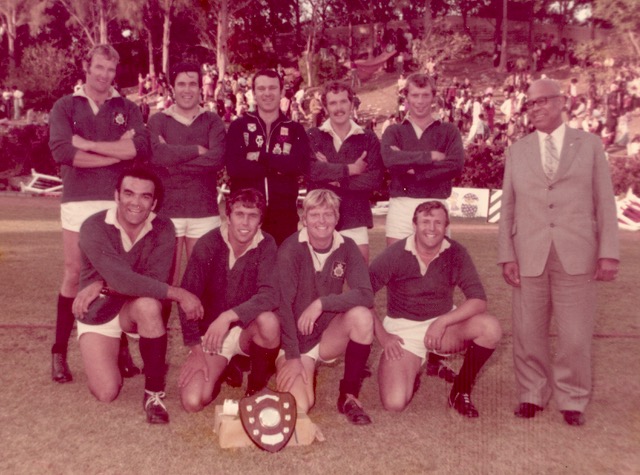 Triumphant Police Tug o' War Team at Annual Agricultural Show circa 1975
Triumphant Police Tug o' War Team at Annual Agricultural Show circa 1975
Top row (l-r) Alex Arnfield, Mick Richardson, Dave Garland (coach) Tony Laughton, Paul Deans
Kneeling - Eddie "Boxhead" Foggo, Roger Brydon, Pete Swann and Davie Kerr
While stationed at Filey I took up triple jumping and represented the Force at the Police Championships in County Durham. I managed 4th with a final jump of 43’10” and was awarded an AAA bronze medal but I never jumped again because my knee didn't like it!
Athletics was my love in sports but unfortunately I tore a cartilage which put an end to all sports for six months when I had an operation for it. It was never right again until after I came out to Bermuda and Dr Colin Cooper saw it. He was a great surgeon and he operated on me and gave me a metal knee which I believe was the first in Bermuda.
Shortly after I arrived in Bermuda I was at the PRC on a lunch hour and I got involved in a darts game. I loved it and started playing in lunch hours for quite awhile. One day there was a darts night at the Police Club, and Mike Paris and I won it. Shortly after this, probably around 1967 or 1968, the Police Club entered a team in the local darts league. The initiator for this was “Nobby” Clark and I was invited to play on that team with Ronnie Lines, “Nobby”, Keith Lovell and Jim Handsley. We came second in the first Division that first year, then we won it back-to-back the next two years. We also won the 1001 darts tournament three years on the trot.
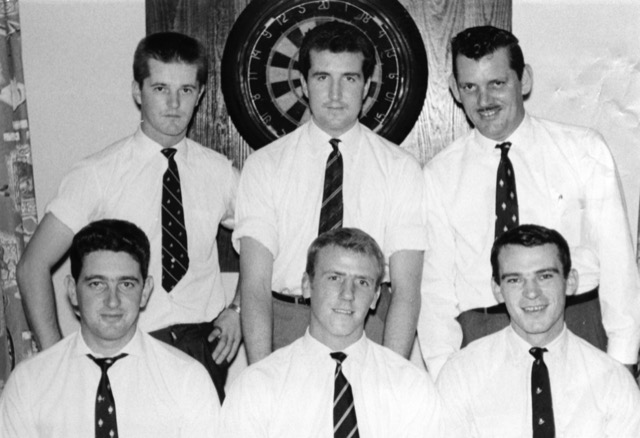 Members of the Police Darts "B" Team
Members of the Police Darts "B" Team
Top Row (l-r) Peter Parnell, ?, ?,
Ken Norman, John Bailey, and Dave Garland
While in the Bermuda Police I was never happier than when it came to sports, particularly football. In the 1961/62 season I scored 14 consecutive hat tricks for the Police second team (as recorded in an article in the 1962 Police Magazine) including a couple of friendly’s with the 1st team. George Linnen watched me play against United and I scored a hat trick. He said you’re playing Monday night at BAA under lights against Wellington Rovers. They were top of the league having played 5 and won 5.
George gave me a team shirt five minutes before kick-off and said get on the pitch. The regular centre forward turned up late and I played. I hit it off big with Clive Donald and we beat them 5 – 2, with Clive scoring 3 goals and me scoring 2. I loved it but I was dropped the next week and Police lost the next five games in a row. Enough said! The previous season finally saw the end of segregated football. I believe you can thank Commissioner George Robins for his involvement in bringing this about. He wanted our Police team to be an integrated team and for us to play all of our players. Mr Robins wrote a letter to the BFC (Bermuda Football Combination) and told them that if all members of the Police Football Club were not eligible to play for the Police then the team would be withdrawn from the league. The next season Arthur Bean and Clive “Tango” Burgess joined us and that was the year when the two leagues came together.
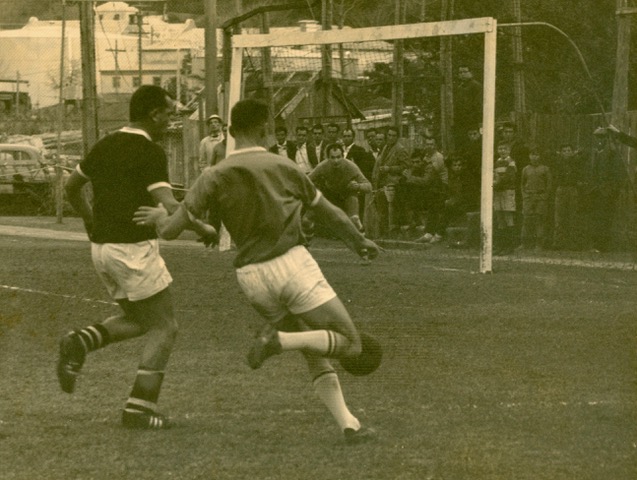 Dave Garland, playing for the Police Team at BAA slips passed
Dave Garland, playing for the Police Team at BAA slips passed
Eddie Gurray of Hotels International and slammed the ball into the net
We had played and beat Nationals in the final of what I believe was the last BFC Cup final, and I scored 2, Clive 1 in a great game. It was after this game that l found out that “Grim Jim” McNiven was against me playing and we had words. So after this I turned to rugby. The team was dominated by two people, one the captain and the other a selector who also worked in H.Q. At the end of the season I was picked for the Nichol Shields semi-final. I scored the only try for police and our goal kicker missed three penalties, all easy ones, and managed to kick 2 from 3 in the second half.
In the final under the lights at BAA we beat the BAA team by 8 points to 3. I scored two tries, 6 of the 8 points. I didn’t play again till the 1976 season and that season we reached the Nicholl Shield final where we beat Teachers 14 points to three. I converted a try, dropped a goal and kicked three penalties for a total of 11 of the 14 points. John Bailey the Captain said in his speech, thanks Dave - a great effort. Thanks John.
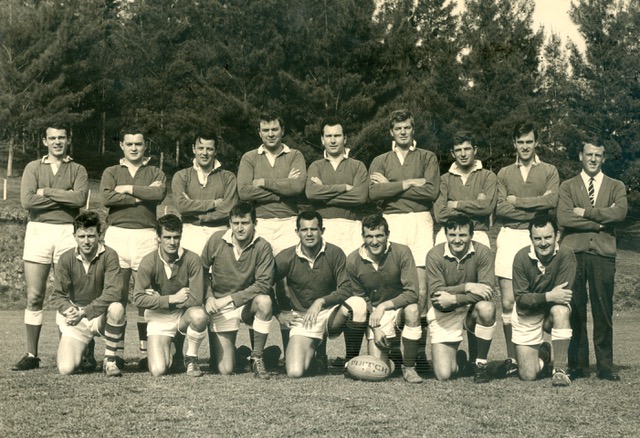
At the start of the season John Bailey had been made Captain and he asked me to start playing rugby again. He told me I would be the kicker, and during that season I averaged 11 points a game and crossed 100 points total. I was secretary that season and kept match records which I handed over at the end of the season. This did not include a game against a Royal Navy ship in which I scored 5 tries and converted 8 tries. The referee stopped scoring at half-time at John Bailey’s request.
I also played Hockey for the first Police team, organised by Connell McBernie. There were four teams in Bermuda in 1964 and we always played Sunday mornings at the Port Royal Field in Somerset. That same year I played for the Bermuda select team in Connecticut, where we won a trophy for the first time. The hockey league ran for about five seasons but I only played for two. As I said earlier, hocky is one tough sport.
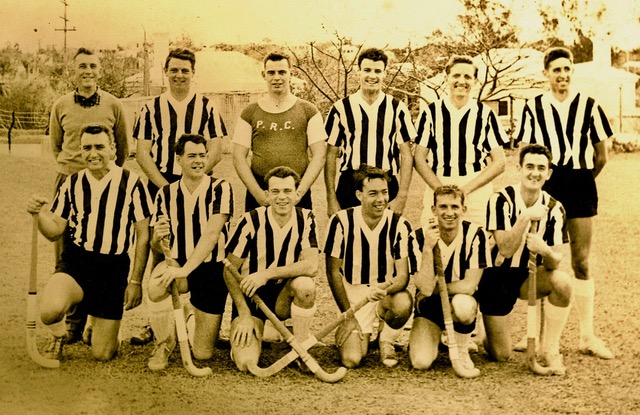 Members of our first Bermuda Police Hockey team circa 1964
Members of our first Bermuda Police Hockey team circa 1964
Top row (l-r) Sid Rubbery (civilian) , Tim Willis, Connell McBurnie, Trevor Langan, Jim Cornes (civilian) , and Tony Harper
Kneeling - Mike Kelly, Colin Chiswell, Dave Garland, Graham Lynne (civilian), George Goddard & Jim Woodward
Sailing became a passion of mine and I crewed for Charley Berry in his International 14 and we won every series at Bermuda Sailboat Club in 1964, and the Royal Bermuda Yacht Club. I won the crews race, and Charlie and I won the long distance race. I still have a silver tankard for winning the crews race. It’s inscribed as the ‘14“ trophy’ for winning crew. It was a bit embarrassing for the awarding officer but I made it into a wishful thinking story and got howls of laughter!
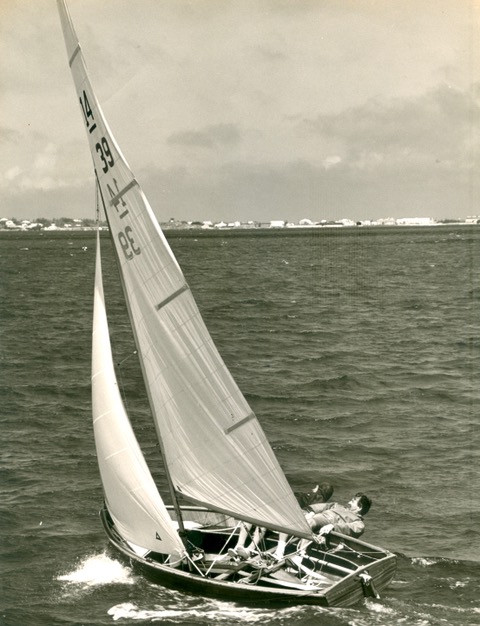 Charlie Berry (right) and Dave Garland (left) enjoyed winning
Charlie Berry (right) and Dave Garland (left) enjoyed winning
ways sailing International 14's in 1964
In 1965, I was a committee member of the Bermuda Sailboat Club which had been operating very successfully from White’s Island in Hamilton Harbour. We were given notice to vacate White’s Island for Government youth programmes. We had about £3,400 pounds in the bank. After a long meeting we decided to start a junior sailing programme. We ordered 8 kit boats from Uffa Fox in Cowes who had started a programme for dads to build his kit boat that could be put together in four hours - cheaply. They were very popular. Members built them when they arrived and I assisted Brownlow Gray in putting two together. This was the first sailing club for kids in Bermuda. When we closed down in May l965, RBYC took over the programme. Today the programme is massive, and as a junior sport it probably has the largest number of kids involved in any kids sports.
It was also in 1965, after the finish of the International 14 class season, that the 14 class boats were all sold to Canada. I was at the RBYC when Shorty Trimingham told me I had been recommended to him as a crew for his new boat, a 42ft new design by Freres. And so began my stint of offshore sailing. Having been a crew on 14 dinghys I knew how to handle Spinnikers and fore deck sails, and I became a foredeck man - changing sails and setting the spiniker. I loved it and after two years in and around Bermuda I sailed on Wizard in the Admirals Cup at Cowes.
I also did the Channel Race overnight about 150 miles, and the Fastnet race about 650 miles. This was fantastic and we had good results but Shorty then decided to retire from racing. He sold Wizard after the race and that was the end of international sailing for me, although I’d made two deliveries of Whistler to Newport but had no leave left. Of all the sports, for me, sailing was tops. Ocean racing is a tremendous challenge, both exhilarating and scary at times, and a test of one’s guts.
I recall one really sad memory from 1973. One week Shorty was sailing us out to the Great Sound to practice but he then announced a change of plans. The Governor, Sir Richard Sharples and wife, Lady Sharples, and the ADC were coming out for a sail and lunch at Lantana. The Governorwas a sailer and kept a 50 footer in the U.K. We had a great afteroon and lunch. One week later he was murdered at Government House along with Hugh, his ADC.
In the early 1980s I got involved in the junior golf program that Jeff Parker had started, and as a result of their abilities at least 10 or 12 of our juniors went to colleges in the States on golf programs and received education to degree level. We had started at the Belmont Golf Club, and along with Doug Tufts and others, the Bermuda Junior golf Association was founded.
I was involved in this program for 17 years and so it developed from around 15 to 20 juniors to over 100 after try-outs that Doug and I ran. I set up a starter program for beginners from eight years of age and I ran it for 10 years. This program was run at Horizons short golf course and was very popular. Many of our best amateurs of today went through that program before graduating to the senior program. We sent many of our juniors to tournaments in the United States, including Junior Worlds.
In the summer of 1968 I first met the love of my life, Sue, in Hamilton. She was out here on holiday and was walking near Bermudiana Road with John and Sean Williams. Sean and Sue grew up together in Swansea South Wales. We chatted for a while and I rode off to get refs. It was about 6pm in the evening.
I thought I really like that girl, so I rang the Williams’s, spoke to Sue, and we arranged a date. At that time I was staying in Benny Martin’s house in Fairylands. Thank god I didn’t have to take her to Prospect! She stayed for two weeks before returning to Wales and I promised to see her in Swansea a few months later, which I did. Somewhere along the line I proposed, was accepted, and we were married at Christ Church, Warwick on 1st March 1969. Sue has been my rock ever since.
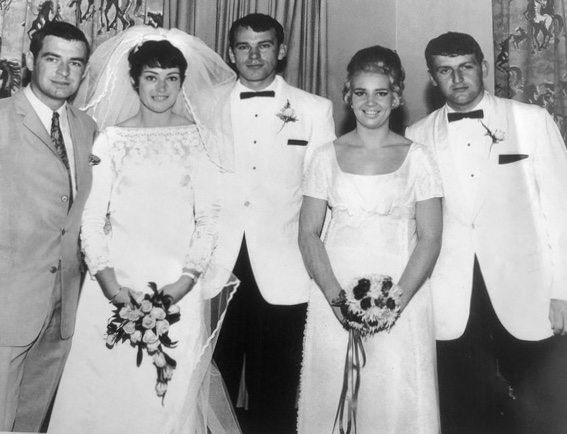 Dave and Sue's Wedding
Dave and Sue's Wedding
(l-r) John Balsden, Sue and Dave, Sian and John Williams
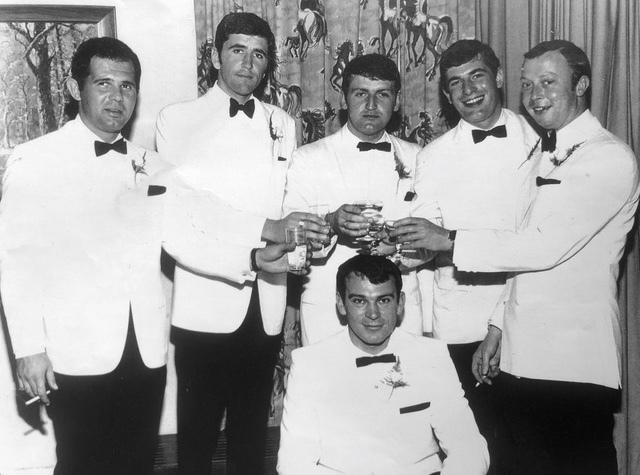 The Boys in White!
The Boys in White!(l-r) Standing - Jack Rouse, Mike Caulkett, John Williams,
I’ve mentioned that Sue and I were married at Christ Church in Warwick which became our regular church. Caitlin and Chris were both christened there, and we attend church regularly and support it in any way we can. Over a period of about 30 years I ran their annual charity golf tournament which raised a fair sum of money. We would hold these tournaments across the street at Belmont Golf Club where I was a member for many years, volunteered as their tournament chairman for two years, and was Vice President of the club the year it closed. (It has since re-opened as Belmont Hill Golf Club)
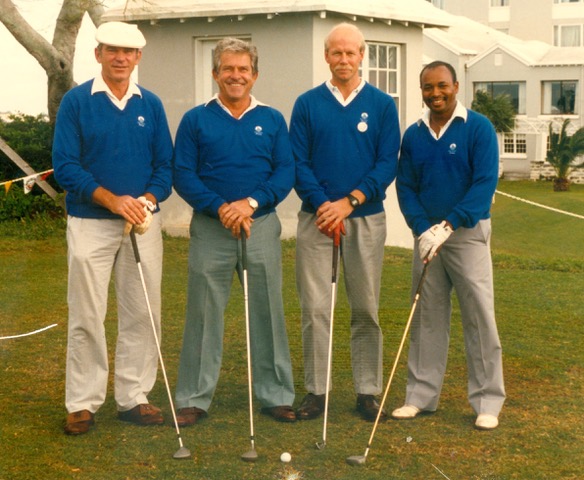 Belmont Goodwill Golf Team
Belmont Goodwill Golf Team
One thing I would like to plug is giving blood. I started donating blood when I was in the Military Police, and in Bermuda I’ve gave over 70 pints. I remember getting called out twice very quickly to give blood and the girls at the donor centre told me it was for a new born baby. They had to change its blood. I found out from a nurse at the donor centre that it had been successful. Boy that made me feel good. Another one was for a police officer who had been attacked and cut with a machete. Dr John Stubbs asked for me to give two pints and said it would be safe to do so. I had to stay there for about five hours, drank a lot of fluids, and after tests, Dr. Stubbs finally let me leave.
Sue and I have been blessed with have two wonderful children; Caitlin attended Warwick Academy, and Christopher attended Saltus and both went on to university. Caitlin received her Masters Degree in Law from Edinburgh and has settled here in Bermuda with her husband, Ross, and their two children, Jodie (now 15) and Isla (now 12). Chris was an outstanding young golfer and received a golf scholarship, attending Columbus University where he received a degree in Management and Marketing. He puts his training to good practice as General Manager of Flanagan’s four businesses, and is also happily settled here with his wife, Allison.
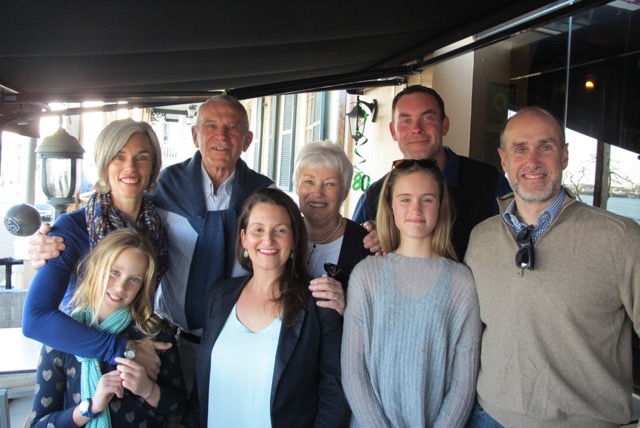 Dave and Family at his 80th Birthday Party held at Flanagan's on Front Street
Dave and Family at his 80th Birthday Party held at Flanagan's on Front StreetTop Row (l-r) Caitlan, Dave, Sue, Chris
Front Row - Isla, Allison, Jodie and Ross
When Sue and I got married we made our home at 23 Mary Victoria Road. Our great friends, Sean and Pat Sheehan lived next door. My home became a retreat for new officers arriving from Britain. I would ask them home for a meal and help them to settle in after arrival. You would be picked up at the airport by members of our group such as Peter Rose, Derek Singleton, and John Bailey. All got the same treatment! Some of the guys we used to have over became ‘Uncles’ to our kids, Uncle “Paddy” (Ackroyd), Uncle Jeff (Baker), and sundry others. At Christmas we would have maybe four or five of the guys round for dinner.
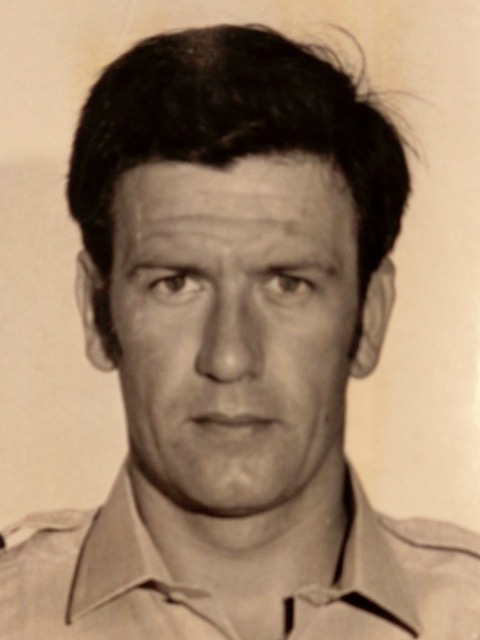 Ian "Paddy" Ackroyd
Ian "Paddy" Ackroyd 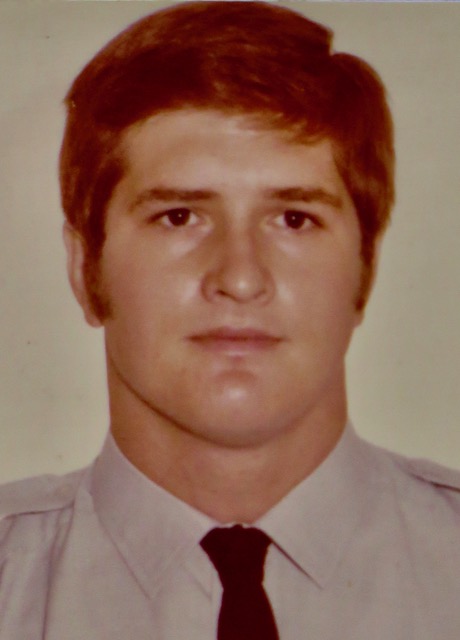 Jeff Baker
Jeff Baker
About a year ago I got a call from Roger Sherratt who said that an officer who served here for 3 years had asked if I could be at the Police Club on a Thursday afternoon to meet him. It was Bob Porritt and he thanked Sue and me for making him welcome when he arrived in Bermuda. Thanks Bob.
When I arrived on 18th April 1961, I was met at the airport by Inspector JCP Hanlon who said come along, bring your bags, and follow me. He took me to a room at Admiralty House that was then being used as barracks, and said, “This is yours, be at Headquarters, Prospect, at 11am. Call traffic if you need a lift.” And he was gone. That was my welcolme to Bermuda!
Admiralty House was then being used to house some of the single men, including John Bailey, Mike Johnson and Bob Stewart. It was about 12 months later that we all moved to the singlemen’s quarters at Prospect near to Mr. Carty’s shop. Those were the days when, if you were a single man you had to live in barracks, and that included Arthur Rose who had been here for 10 years when I arrived.
I’m now fully retired and will be 83 next birthday. I’ve had a few health issues – open heart surgery 18 months ago, and 6 months ago I had a total shoulder replacement so I’ve not been so active recently, but I’m recovering well and played my first golf game last week with the Bermuda Seniors at Belmont, and Roger Sherratt as my partner.
 Dave and Sue Garland enjoying a holiday in Bonnie Scotland
Dave and Sue Garland enjoying a holiday in Bonnie Scotland
Sue and I still do some travelling and go away every summer. We’re very lucky to have both of our children and their partners, and our two lovely grandchildren, here with us in Bermuda.
I can still vividly remember arriving back in April 1961 I’d always lived near the sea in Yorkshire so it was home from home to live close to the water, with the added benefit that the sea here is so beautiful – and warm.
It’s been a great life, but at 83 it can sometimes be bloody boring!
------------------------------------
14th April 2020
After publishing the above article we received the following comments from our good friend Jeff Baker who had a long association with Dave and Sue and their family:-
COMMENTS FROM JEFF BAKER
I was just reading through the Ex Bermuda Police Association article on Dave Garland. Having read it, I felt that I should add a little of my own experiences with Dave and Sue Garland.
Just a little re-cap on myself. I was fortunate enough to be hired by the Bermuda Police Service in 1971 at the young age of twenty, I suppose in some large part due to having played Junior International Rugby and Athletics. The Police Commissioner at the time, George Duckett being a rugby enthusiast.
I had been accepted by the Gwent Police, but when the opportunity to go to Bermuda came up it did not take long to decide on Bermuda. This was really a no brainer as coming from the Mining valleys of South Wales; there was a lot of unemployment and depression. After arriving in Bermuda and going through the training process. I was stationed in Hamilton and later Cycle Squad, with stints in the Murder room and Traffic.
On arriving on the Island, I was quickly snapped up by the Police rugby team and for the ten years I was fortunate to be in Bermuda, I was a player, coach, or referee. It was during these early years, I cannot recall the events now, but I became friendly with Dave and Sue Garland. Dave was a stalwart with the rugby team and Sue was a Welsh Lass. Being a young, probably naïve fellow, I think with my Welsh ties and rugby, they felt that I needed a little of home nurturing.
The once in a while invitation to 23 Mary Victoria road, to enjoy some friendly conversation and dinner, quickly turned into possibly my second home. I know that many other young PC’s were also recipients of the Garland’s kindness. It was nothing to celebrate Christmas at Dave and Sue’s with Phil Every, Catherine Dorrington, and a number of others over the years.
During my time in Bermuda, I had two mishaps, which especially brought me under their care. One I came off my motor cycle, attacked by one the road monsters (many will have also been attacked by one of the many monsters creeping around Bermuda, all roads departing from the PRC). This mishap required a short stay in their guest room. Another was a rugby injury, dislocating my clavicle and again, I was carefully ministered to.
Over the years I know that they have opened their home and given of warmth and kindness to many single officers arriving on the Island, and I count myself blessed to have been included in this, and to call them friends.
Paddy Ackroyd also mentioned in Dave’s Article, now lives in Ontario, Canada, and we occasionally get together and reminisce our tenures in Bermuda.
At this time of World pandemic and social isolating it is with great joy that I remember my sojourn in Bermuda, and raise a glass “To absent friends".